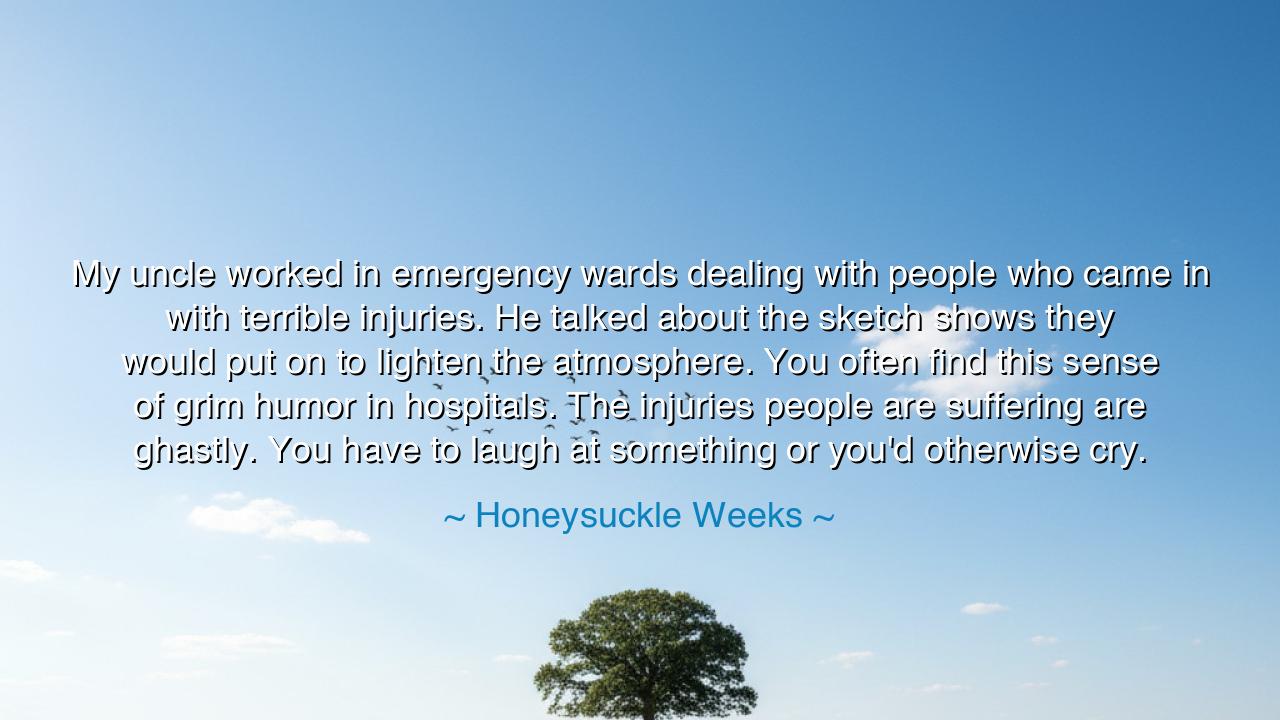
My uncle worked in emergency wards dealing with people who came
My uncle worked in emergency wards dealing with people who came in with terrible injuries. He talked about the sketch shows they would put on to lighten the atmosphere. You often find this sense of grim humor in hospitals. The injuries people are suffering are ghastly. You have to laugh at something or you'd otherwise cry.






In the vast journey of the human experience, where suffering and joy walk side by side, there exists a profound understanding passed down through generations: that humor can be the balm for the soul in the face of the deepest tragedy. Honeysuckle Weeks speaks of this wisdom when she reflects on her uncle’s work in emergency wards, where patients came in with terrible injuries, and yet, in the midst of such anguish, the medical staff would put on sketch shows to lighten the atmosphere. "You often find this sense of grim humor in hospitals. The injuries people are suffering are ghastly. You have to laugh at something or you'd otherwise cry." These words reveal not just the role of humor in hospitals, but a timeless truth: when faced with the impossible, the unbearable, it is humor that becomes the vessel through which we navigate our darkest hours.
This understanding of humor as both shield and weapon in the face of suffering is ancient. The Greeks, those philosophers and poets of old, understood well the role of laughter in the human condition. In the tragedies of Sophocles, such as the Iliad and Oedipus Rex, the gravest of human flaws—anger, pride, and despair—were intertwined with moments of irony and humor. These moments of levity were not escapes from the tragedy, but reminders of the absurdity and complexity of life itself. They understood that to face life’s hardships without humor would lead to madness, for it is through laughter that we find the strength to endure the harshest blows.
Consider, too, the great Roman playwright Terence, who lived in the age of the Empire. His comedies, though lighthearted on the surface, were rich with human insight. Terence knew that the suffering of individuals, when viewed from a distance, often revealed absurdities—whether it be the foolishness of youth, the folly of pride, or the irrationality of revenge. Much like Weeks’ uncle, Terence understood that humor, even in the gravest circumstances, was not an attempt to diminish pain, but a means of reflecting on it in a way that eases the soul. In hospitals, where the specter of death often looms, humor becomes a vital force, not to avoid the reality of suffering, but to face it with courage.
It is said that the greatest warriors of ancient Rome and Greece, those who fought on the front lines of battle, often used humor to survive the harshness of war. Julius Caesar, though known for his strategic brilliance, was also famous for his wit, which he used to uplift his troops in times of adversity. Humor became a way to strengthen the bonds of brotherhood in the face of relentless battle. Similarly, Weeks’ uncle, through his humor, likely sought to ease the burden of both the patients and his fellow healthcare workers, turning the ghastliness of injury into something bearable through shared laughter. Humor, in these dark moments, is not merely a distraction but a force that transforms suffering into a shared experience, uniting those who face it together.
In the midst of suffering, humor is a transformative power, allowing the individual to distance themselves from the overwhelming weight of grief. The story of Victor Frankl, a man who survived the Holocaust, serves as a powerful example of this. In his book Man’s Search for Meaning, Frankl recounts how, even in the face of unimaginable suffering, the prisoners who were able to find humor—even in small ways—were more likely to survive. His tenacity in the face of the most brutal conditions was not just born of physical strength, but of an understanding that laughter could grant him a mental and emotional reprieve, allowing him to endure when all hope seemed lost. Frankl’s life and work are a testament to the fact that even in the deepest suffering, the human spirit can find light through humor, and in this way, we can transform even the darkest of circumstances.
Thus, the lesson we glean from Weeks’ reflection is clear: in the face of suffering, we must not abandon the power of humor. It is not the absence of seriousness that humor offers, but the ability to live in the face of it. Whether in the emergency wards, the battlefields, or the everyday struggles of life, laughter allows us to reclaim a part of ourselves when the world seeks to break us. It is the reminder that we are more than our pain, that even in the depths of darkness, we can find a light that will guide us forward. Humor is the resilience of the human spirit, the force that makes us stronger and more united in times of great adversity.
So, let us embrace this wisdom in our own lives. When faced with pain, grief, or disappointment, let us not lose ourselves in despair. Instead, let us find the humor that allows us to endure, to laugh in the face of tragedy, and to connect with those around us. Whether in moments of personal suffering or in the challenges of the world, let humor be our shield—our way of seeing beyond the immediate darkness to the light that still shines within us. For in the words of the ancients, laughter is not the absence of pain, but the transformation of it, the light that pierces through the shadows of life, giving us the strength to carry on.






AAdministratorAdministrator
Welcome, honored guests. Please leave a comment, we will respond soon